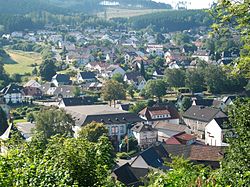You can help expand this article with text translated from the corresponding article in German. (November 2022)Click [show] for important translation instructions.
|
Hachen | |
|---|---|
 Hachen | |
| Coordinates: 51°22′N07°58′E / 51.367°N 7.967°E | |
| Country | Germany |
| State | North Rhine-Westphalia |
| Admin. region | Arnsberg |
| District | Hochsauerlandkreis |
| Town | Sundern |
| Elevation | 207 m (679 ft) |
| Population | |
• Total | 2,773 |
| Time zone | UTC+01:00 (CET) |
| • Summer (DST) | UTC+02:00 (CEST) |
| Dialling codes | 02935 |
| Website | www |
Hachen is an Ortschaft (subdivision) of the town of Sundern in the Hochsauerland district of North Rhine-Westphalia, Germany. [2] It is the second largest Ortschaft of Sundern.




